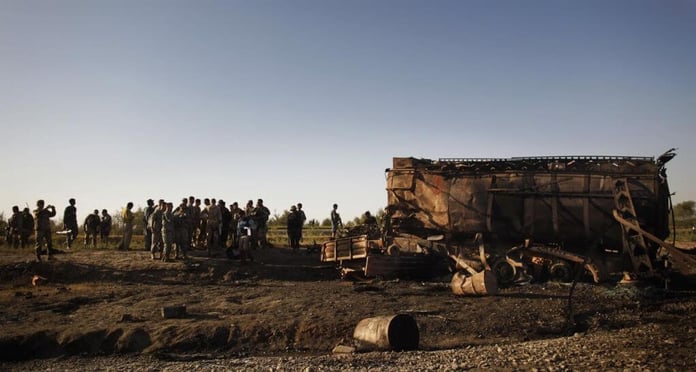Afghan Abdul Hanan lost two sons in the NATO attack. The European Court of Human Rights is to clarify whether the attack requested by a German colonel constitutes a violation of human rights.
Victim lawyer Karim Popal (right) and colleague Peter Derleder at a court hearing in Bonn in March 2013The Federal Government’s Human Rights Commissioner, Almut Wittling-Vogel, expressed understanding of the “deep suffering” of the family father at the trial before the Grand Chamber of the Court. According to lawyer Heike Krieger, the federal government claims that the attack was not carried out under German jurisdiction, “since the attack was carried out on behalf of the United Nations”.
Plaintiff Hanan’s lawyer, on the other hand, pointed out that there had been “a series of binding instructions” from the German colonel for the air attack that had been carried out without any UN control. This is a violation of the European Convention on Human Rights, he argued.
Trucks as rolling bombs?
Klein, as the commander in Kunduz, had bombarded two tankers filled with kerosene. The background was the capture of the vices by Taliban fighters near the German encampment in Kunduz. Klein feared that the trucks could be used as rolling bombs against the camp. At the request of the Bundeswehr, US warplanes attacked the tank trucks. However, there were numerous civilians in the area.
The exact number of victims is still unknown
According to various sources, the air attack killed 14 to 142 people, including 14 to 113 civilians. The Bundeswehr reported the number of victims as 91 dead and 11 injured. The ECHR emphasized that the exact number of fatalities was not known.
Georg Klein, the then commander in Kunduz, requested the NATO attack (photo from September 2009)Popal’s protocols show that the pilots questioned the command of the German colonel in view of a large number of people around the tank trucks. In addition, according to Popal’s research, “not a single” Taliban was among the dead. Germany made voluntary one-time payments of $ 5,000 per family at the time. According to Popal, due to the corruption rampant in Afghanistan, this did not reach everyone affected. Aid projects such as an orphanage were financed by private donors.
Fall triggered government crisis in Berlin
The air raid had led to a government crisis following initial attempts by the federal government to appease. The then Minister of Defense, Franz Josef Jung, initially defended the attack. In late November 2009, he resigned from his new job as minister of labor after allegedly covering up explosive information about the attack.


